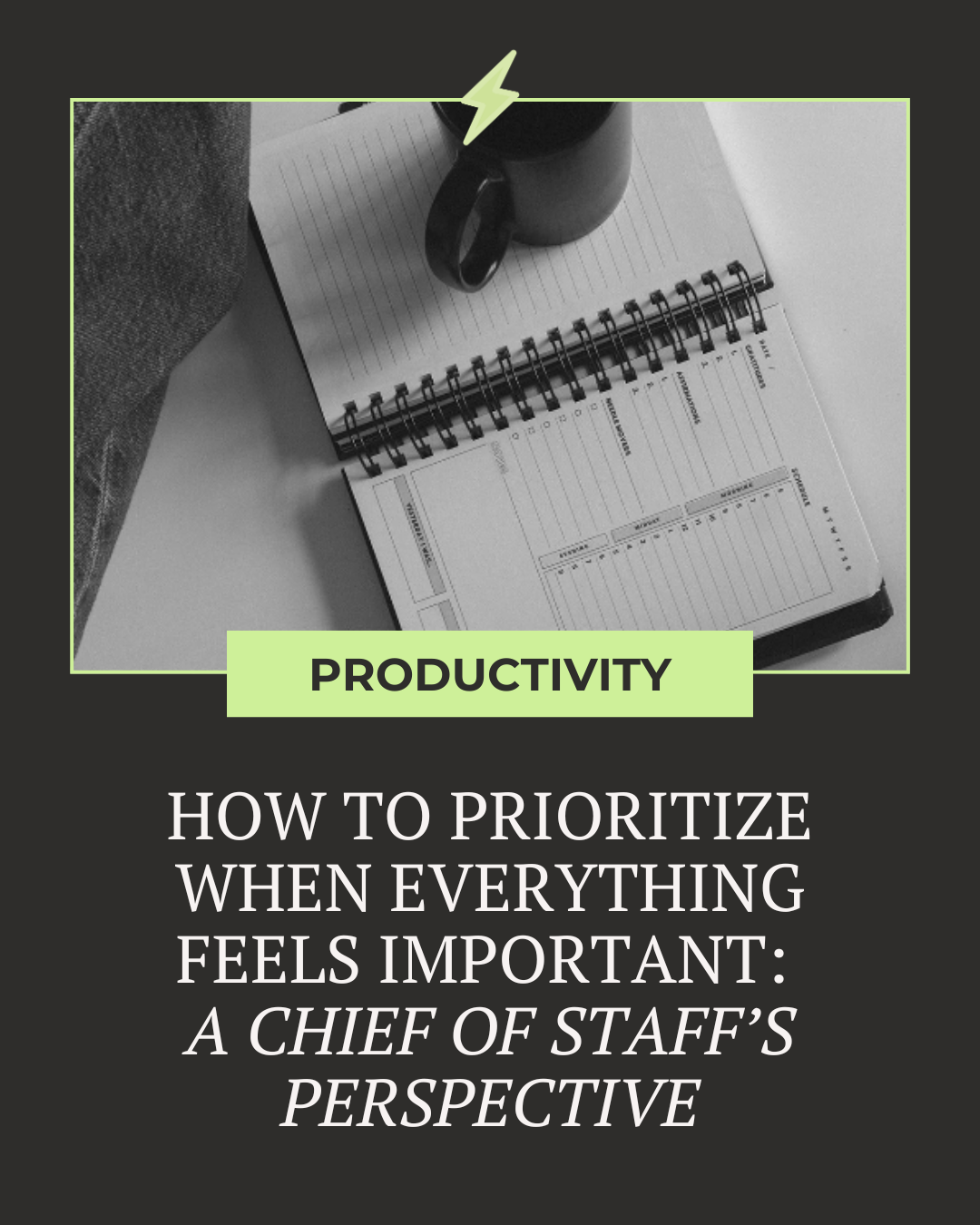How to Prioritize When Everything Feels Important
If there’s one thing every leader wrestles with, it’s the feeling that everything on their plate is urgent and important.
From the investor email waiting for a reply, to the slightly overdue client deliverable, to the team member who needs direction, the list is endless.
It’s easy to reach the end of the day exhausted, only to realize the truly strategic work, the kind that drives growth, was once again pushed to tomorrow.
As Chief of Staff, I see this daily.
The truth is, prioritization isn’t just about making to-do lists or organizing your time. It’s about making ruthless choices in the service of the bigger picture.
AVOID THE PRODUCTIVITY Illusion of “Everything is Important”
One of the hardest realities to accept is that not everything can be equally important. When you treat every task as urgent, you create an endless cycle of firefighting.
The cost of this mindset isn’t just burnout, it’s stagnation.
You stay busy but don’t move forward.
From my vantage point, the leaders who succeed are the ones who can pause, step back, and identify what truly matters for the business right now, even if it means leaving other things unfinished.
1. DefinE the Real Priorities IN YOUR TASK LIST
Ruthless prioritization starts with clarity. That means asking uncomfortable but necessary questions:
If we could only accomplish three things this week, what would move the needle most?
What work, if left undone, would have the biggest negative impact?
What can only be done by the leader, and what can be done by someone else?
When you frame your choices this way, you begin to see the difference between “urgent” and “essential.” The urgent often shouts the loudest, but the essential drives real progress.
2. LEARN The Power of Saying No
Another truth about prioritization is that it requires saying “no” a lot. No to the project that sounds exciting but doesn’t align with strategic goals. No to the meeting that could be solved with a quick update. No to the tasks that feel comfortable but don’t actually matter. As a Chief of Staff, I often find myself being the guardian of “no,” protecting leaders from the distractions that pull them away from their highest-value work. Saying no doesn’t mean you’re not committed; it means you’re committed to the right things.
3. PRODUCTIVITY IS BETTER WITH Systems That Support Focus
Prioritization isn’t a one-time decision, it’s a rhythm. The most effective leaders I work with have systems in place to keep priorities clear and visible. Weekly planning sessions, clear goal-setting frameworks, and consistent communication rhythms all help keep teams aligned. Without these systems, even the best intentions get drowned in the chaos of day-to-day demands. With them, leaders don’t have to decide every moment from scratch. They already know what matters most and can act accordingly.
4. Let Go of “Perfection” to become more productive
Perhaps the hardest part of ruthless prioritization is accepting that some things simply won’t get done. And that’s okay. Leadership is about trade-offs. Choosing to focus on the work that creates the biggest impact means letting go of the illusion that you can do it all. This is where delegation and trust come in. Handing off responsibilities to others and empowering your team ensures that even if you can’t touch everything, the right things still move forward.
BECOMING A PRODUCTIVE LEADER
When everything feels important, the real skill of leadership lies in recognizing what actually is.
Prioritization isn’t about working harder or faster. It’s about being willing to make the hard choices that protect your time, energy, and focus for what truly matters.
As a Chief of Staff, I’ve learned that ruthless prioritization doesn’t just make leaders more productive. It makes them more effective, more present, and ultimately more impactful.
Because in the end, success isn’t measured by how much you do, but by how much of the right work you do.
ABOUT THE AUTHOR
Summer has over 15 years of experience in business management and operations, In this time, Summer has developed a keen understanding of the intricacies involved in running successful businesses.
Her work has empowered numerous businesses to connect authentically with their audiences, build strong brands, and achieve their marketing goals.



